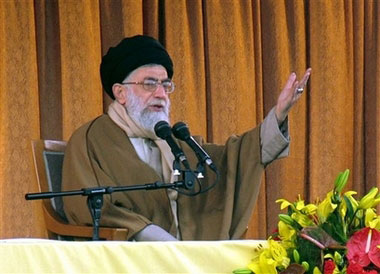Khamenei: Iran would retaliate if attacked
(Reuters)Updated: 2007-03-22 07:25
Khamenei, who has previously threatened U.S. regional interests if attacked, was addressing a big crowd of pilgrims at Iran's holiest shrine in the northeastern city of Mashhad to mark the Iranian new year, which falls on March 21.
"If they want to threaten us and use force and violence against us, they should not doubt that Iranian officials will use all they have in their power to deal a blow to those who assault them," he said in the speech aired on television.
The U.N. Security Council is this week considering new sanctions against Iran over its refusal to suspend its uranium enrichment program, whose product can be used to make fuel for power generation or, when more highly enriched, nuclear weapons.
But Khamenei's speech, and a defiant New Year address by President Mahmoud Ahmadinejad earlier on Wednesday, showed no intention by Iran of bowing to foreign pressure.
The world's fourth-largest oil exporter insists the program is peaceful and aimed only at generating electricity.
Khamenei said Iran's nuclear work followed international rules, but if major powers via the Security Council took "illegal actions" and ignored Iran's rights, "we can also carry out illegal actions and we will do that."
Washington has said it would prefer a diplomatic solution to the stand-off, but has not ruled out military options, though Britain's Foreign Secretary Margaret Beckett said world powers were not preparing for a strike against Tehran.
"No one is preparing for military action," she told reporters in the United Arab Emirates capital Abu Dhabi after talks with officials of the Gulf Arab ally.
"The purpose of sanctions, the purpose of pushing further pressure on Iran is to get them to negotiations," Beckett said. "We all very much hope that they will."
The UAE and fellow U.S.-allied Gulf Arab neighbors of Iran have expressed concern over its nuclear program and raised fears of a regional nuclear race they announced plans to acquire nuclear energy capability in December.
Khamenei said Iran is ready to sign a joint defense treaty with Gulf countries, state television said, without elaborating.
PSYCHOLOGY
In his address earlier on Wednesday, Ahmadinejad accused some big powers of waging psychological warfare against Iran.
"By psychological warfare, propaganda and misuse of the organizations they have themselves created ... they are trying to prevent our nation's development," Ahmadinejad said.
He has previously accused the United States and Britain of using the Security Council as a tool against Iran.
The proposed U.N. resolution would embargo Iranian arms exports and freeze financial assets abroad of 28 individuals, groups and companies.
It is a follow-up to a previous resolution adopted by the Council in December and was expected to be voted on this week after Germany and permanent council members Britain, China, France, Russia and the United States agreed on the text.
But South Africa, the council's current chair, has called for all the main proposed sanctions to be dropped. The council could probably adopt the measure without South African backing, but the major powers had wanted it passed unanimously.
Russian Foreign Minister Sergei Lavrov said amendments proposed by South Africa and Indonesia deserved "attentive consideration."
He also said Russia, which has commercial and political ties to Tehran, would not back "excessive sanctions" against Iran.
Russian officials say they share Western concerns about a nuclear-armed Iran but argue a policy of constructive engagement can prevent this more effectively than one that corners Tehran.
Earlier this week Russia denied a newspaper report that it had threatened to halt work on building Iran's Bushehr nuclear power station unless Tehran stopped uranium enrichment.
At U.N. headquarters in New York, negotiators said Qatar had also submitted amendments to the draft, but that they and those proposed by Indonesia were general and could be accommodated.
"More challenging for the permanent five is the South African amendments, much more challenging," China's deputy U.N. ambassador Liu Zhenmin told reporters.
He said negotiators were aiming at a vote this week "but it seems that this
week is not possible."
|
||
|
||
|
|

